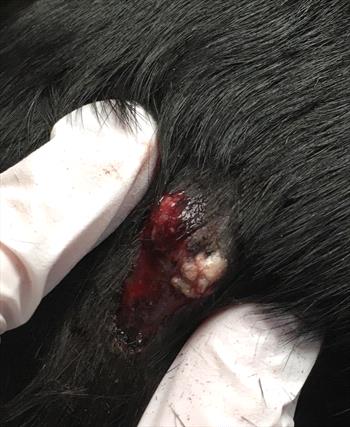
Any ruptured follicular cyst like this dog's should not be squeezed at home, but should be taken to a veterinarian for care. Photo by Dr. Roberta Riedi.
What are follicular cysts in dogs?
Follicular cysts are large bumps, or nodules, on a dog’s skin. They are one of many types of bumps, or skin masses, that dogs can have. Follicular cysts get their name because they start from the hair follicle. They may ooze a thick white, yellow, or brown material and may become itchy or painful as they grow in size. Usually only one follicular cyst is seen, but rarely some dogs have many at the same time.
They are also known as:
Isthmus or tricholemmal cyst: isthmus-catagen cyst
Infundibular cyst: epidermoid cyst, epidermal inclusion cyst, sebaceous cyst, wen
Matrical cyst
Hybrid cyst: mixed cyst, panfollicular cyst
How are follicular cysts diagnosed?
Your veterinarian will take skin samples and examine them under the microscope. Your veterinarian may start by taking a small sample from the skin mass using a needle, which is called a fine needle aspirate. Especially if the follicular cyst is growing or painful, your veterinarian may remove the entire mass in a surgery (biopsy).
How are follicular cysts treated?
Follicular cysts do not spread beyond the skin but can become infected. If this happens, your veterinarian may take a sample for skin culture (bacterial culture and sensitivity) to choose an appropriate antibiotic (a drug that fights bacteria). If a follicular cyst grows in size and becomes itchy or painful, your veterinarian may recommend surgery. A follicular cyst will not regrow after it is removed.